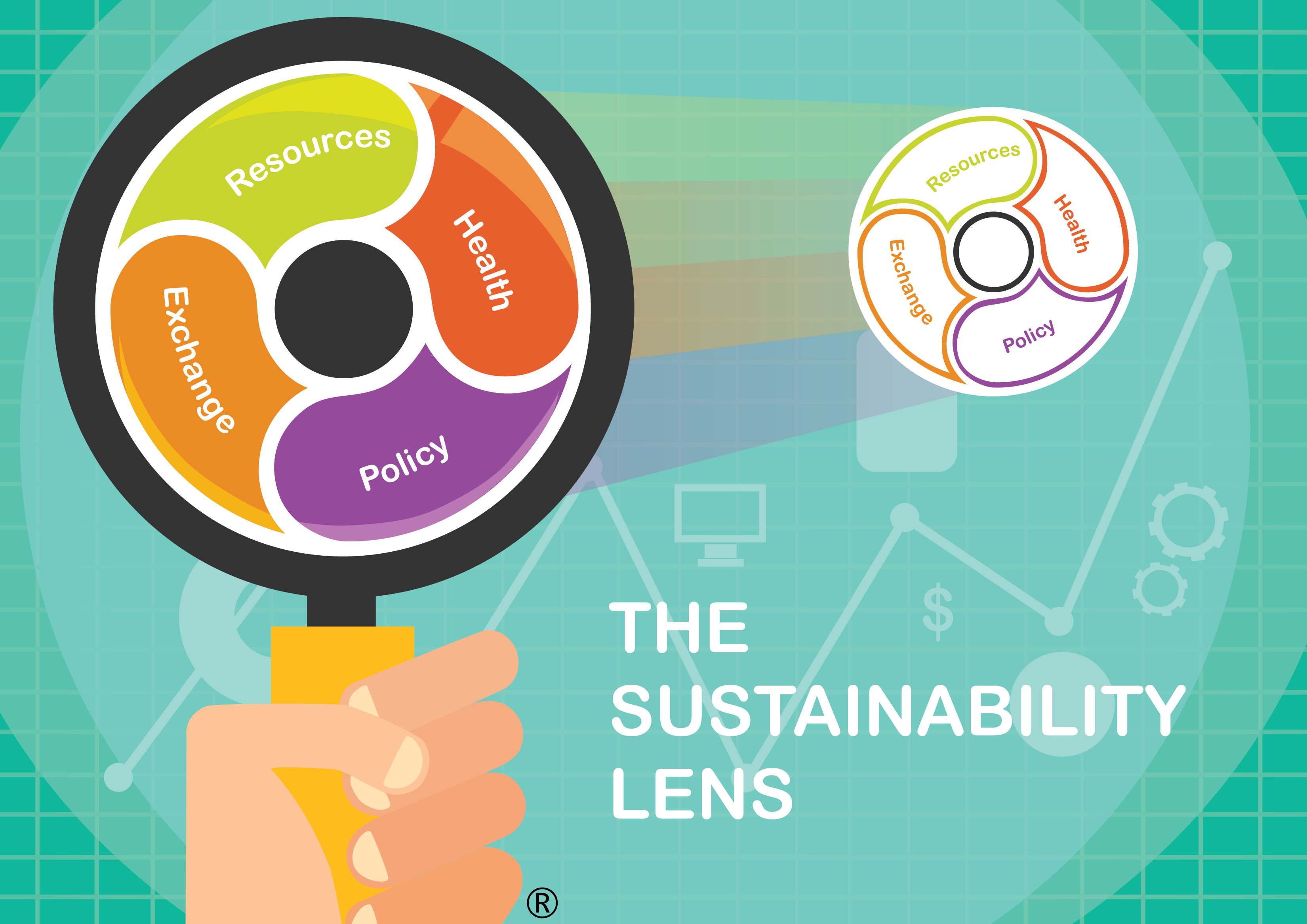The Sustainability Lens Game online live gameplay
The Sustainability Lens Game components
The Sustainability Lens Game set up
The Sustainability Lens Game
-
Title of the submitted project/idea
The Sustainability Lens Game
-
Title of the submitted project/idea (English)
The Sustainability Lens Game
-
URL of a video introducing the submitted project or idea (5 minutes or less)
https://youtu.be/0M3wpBoeF7A - Gameplay by nuerodiverse (ADHD, autism, dyslexia) Landmark College students, USA
-
Brief concept description of the submitted project/idea
The Sustainability Lens Game is a board game based on the Business Model Canvas design that guides players to build innovative, fun, and resilient enterprises that meet Sustainable Development Goals for for-profit and non-profit businesses and classroom projects. No experience is needed though even seasoned developers benefit from the insights and structure the Sustainability Lens provides. The Game ends with creating a fully developed Sustainable enterprise with genuine innovations, partnerships, and systems that can be implemented in real-time for social, economic, market, and environmental gain.
Who: Creative, energizing, and engaging – this Game is for everyone - from sustainability enthusiasts, teachers, entrepreneurs, and developers to your friend next door. More specifically, it is for 2 to 18 players ages 12 and up. Teachers use the Sustainability Lens Game as a part of their classroom curriculum, developers use it as a consulting tool, and non-profit organizations use it as a community development methodology.
What: Enterprises are uniquely positioned with the agility and creativity needed to make the changes we need to have a sustainable future - one that balances individual needs with our global community and natural environment. Find new ways to meet Sustainable Development Goals, grow community, regenerate the environment, and strengthen the workforce. Read the book that explains the origins of the Game: Stenn, T. (2017). Social Entrepreneurship as Sustainable Development, Introducing the Sustainability Lens. Palgrave Macmillan.
How: The Sustainability Lens Game as a board game can be played alone in 20 minutes, in teams for 45 to 90 minutes, or scaled to a whole semester project or weekend retreat for 18 or more participants. There is also a live, online, facilitated gameplay where groups of up to 45 students can play via zoom or other conferencing platforms from anywhere in the world. There is an optional facilitator certification training program too. -
Brief concept description of the submitted project/idea (English)
The Sustainability Lens Game is a board game based on the Business Model Canvas design that guides players to build innovative, fun, and resilient enterprises that meet Sustainable Development Goals for for-profit and non-profit businesses and classroom projects. No experience is needed though even seasoned developers benefit from the insights and structure the Sustainability Lens provides. The Game ends with creating a fully developed Sustainable enterprise with genuine innovations, partnerships, and systems that can be implemented in real-time for social, economic, market, and environmental gain.
Who: Creative, energizing, and engaging – this Game is for everyone - from sustainability enthusiasts, teachers, entrepreneurs, and developers to your friend next door. More specifically, it is for 2 to 18 players ages 12 and up. Teachers use the Sustainability Lens Game as a part of their classroom curriculum, developers use it as a consulting tool, and non-profit organizations use it as a community development methodology.
What: Enterprises are uniquely positioned with the agility and creativity needed to make the changes we need to have a sustainable future - one that balances individual needs with our global community and natural environment. Find new ways to meet Sustainable Development Goals, grow community, regenerate the environment, and strengthen the workforce. Read the book that explains the origins of the Game: Stenn, T. (2017). Social Entrepreneurship as Sustainable Development, Introducing the Sustainability Lens. Palgrave Macmillan.
How: The Sustainability Lens Game as a board game can be played alone in 20 minutes, in teams for 45 to 90 minutes, or scaled to a whole semester project or weekend retreat for 18 or more participants. There is also a live, online, facilitated gameplay where groups of up to 45 students can play via zoom or other conferencing platforms from anywhere in the world. There is an optional facilitator certification training program too. -
Detailed description of the submitted project/idea
The Sustainability Lens Game - developed by Dr. Tamara Stenn, a US economist and social entrepreneur - is built on years of work in sustainable development, leadership, and US Fulbright research into Andean producers' well-being and most recently as an instructor to neurodiverse college students with ADHD, dyslexia and autism. The Sustainability Lens is a compilation of mindsets and approaches which create many options for building more innovation, fun, and resilience within an organization. It was first introduced in the book, Social Entrepreneurship as Sustainable Development, Introducing the Sustainability Lens (Stenn, 2017). The Lens engages us in reimagining the use of resources, building community health, policy and advocacy, and multiple means of exchange. It is grounded in the following four concepts: Suma Qamana, Circles of Sustainability, Permaculture, Solidarity Economy. Created using universal design tools and multi-modal ways of engagement, the Game is accessible for players who learn differently.
Suma Qamana, also known as Living Well, comes from Andean indigenous wisdom passed down 4,000 years. Governments people today are re-imaging their worldview based on the chakana (Southern Cross) - a balance between wisdom (knowing), love, action (doing), and leadership (power) brought together by a spiraling, interconnected life force. Governments in Bolivia, Ecuador, and Peru have re-written their constitutions based on the teachings of Suma Ramana. The four balance points of the chakana form the four points of the Sustainability Lens. Stenn learned of Suma Qamana during her 20 years living amongst the Andean people witnessing the re-birth and application of indigenous ways.
Circles of Sustainability grew out of a project born from the United Nations Development Program. Circles of Sustainability is a global project of people's self-reported well-being based on economic, environmental, cultural, and political experiences. Carried out by stakeholders in the communities studied, it gives a voice to those not easily heard while building collaboration and opportunity—the four concentrations of Circles of Sustainability complement those of the chakana. Stenn is a global associate on the Circles project researching in both the US and Bolivia.
Permaculture, manifested in natural systems of regeneration and abundance, reinforces two parts of the Sustainability Lens. In the Game we mimic the redundancy and diversity of nature and the multiple systems with a model that supports growth, life, and well-being.
Solidarity Economy is about working together to share in the use and distribution of resources. It includes creation, production, exchange and transfer, waste, consumption, and surplus allocation, which becomes a renewable, circular creation. The Game creates new and exciting ways to acquire and share resources and collaborate with like-minded businesses.
In 2017, Stenn published the book, Social Entrepreneurship as Sustainable Development, Introducing the Sustainability Lens, which explains the origins of the Game.
Here's what others say:
"This work redefines concepts of sustainability and social entrepreneurship that for too long have been under the sway of narrowly conceived economic mandates such as the necessity of growth." Professor Paul James, Western Sydney University, Australia.
"A really good learning tool. It puts me right in the role of an entrepreneur who is trying to be responsible and have a great product." – Sara Bernheim, Conservation Specialist.
"I like the creative aspects and the Game. It's not just about winning; it's a fun way to develop a new mindset." Margot Pero, student
"This is amazing; it gave me a whole different way to look at how I live." – Jesse Lepkoff, musician. -
Detailed description of the submitted project/idea (English)
The Sustainability Lens Game - developed by Dr. Tamara Stenn, a US economist and social entrepreneur - is built on years of work in sustainable development, leadership, and US Fulbright research into Andean producers' well-being and most recently as an instructor to neurodiverse college students with ADHD, dyslexia and autism. The Sustainability Lens is a compilation of mindsets and approaches which create many options for building more innovation, fun, and resilience within an organization. It was first introduced in the book, Social Entrepreneurship as Sustainable Development, Introducing the Sustainability Lens (Stenn, 2017). The Lens engages us in reimagining the use of resources, building community health, policy and advocacy, and multiple means of exchange. It is grounded in the following four concepts: Suma Qamana, Circles of Sustainability, Permaculture, Solidarity Economy. Created using universal design tools and multi-modal ways of engagement, the Game is accessible for players who learn differently.
Suma Qamana, also known as Living Well, comes from Andean indigenous wisdom passed down 4,000 years. Governments people today are re-imaging their worldview based on the chakana (Southern Cross) - a balance between wisdom (knowing), love, action (doing), and leadership (power) brought together by a spiraling, interconnected life force. Governments in Bolivia, Ecuador, and Peru have re-written their constitutions based on the teachings of Suma Ramana. The four balance points of the chakana form the four points of the Sustainability Lens. Stenn learned of Suma Qamana during her 20 years living amongst the Andean people witnessing the re-birth and application of indigenous ways.
Circles of Sustainability grew out of a project born from the United Nations Development Program. Circles of Sustainability is a global project of people's self-reported well-being based on economic, environmental, cultural, and political experiences. Carried out by stakeholders in the communities studied, it gives a voice to those not easily heard while building collaboration and opportunity—the four concentrations of Circles of Sustainability complement those of the chakana. Stenn is a global associate on the Circles project researching in both the US and Bolivia.
Permaculture, manifested in natural systems of regeneration and abundance, reinforces two parts of the Sustainability Lens. In the Game we mimic the redundancy and diversity of nature and the multiple systems with a model that supports growth, life, and well-being.
Solidarity Economy is about working together to share in the use and distribution of resources. It includes creation, production, exchange and transfer, waste, consumption, and surplus allocation, which becomes a renewable, circular creation. The Game creates new and exciting ways to acquire and share resources and collaborate with like-minded businesses.
In 2017, Stenn published the book, Social Entrepreneurship as Sustainable Development, Introducing the Sustainability Lens, which explains the origins of the Game.
Here's what others say:
"This work redefines concepts of sustainability and social entrepreneurship that for too long have been under the sway of narrowly conceived economic mandates such as the necessity of growth." Professor Paul James, Western Sydney University, Australia.
"A really good learning tool. It puts me right in the role of an entrepreneur who is trying to be responsible and have a great product." – Sara Bernheim, Conservation Specialist.
"I like the creative aspects and the Game. It's not just about winning; it's a fun way to develop a new mindset." Margot Pero, student
"This is amazing; it gave me a whole different way to look at how I live." – Jesse Lepkoff, musician. -
URL of your project / idea
https://www.sustainabilitylensgame.com/


